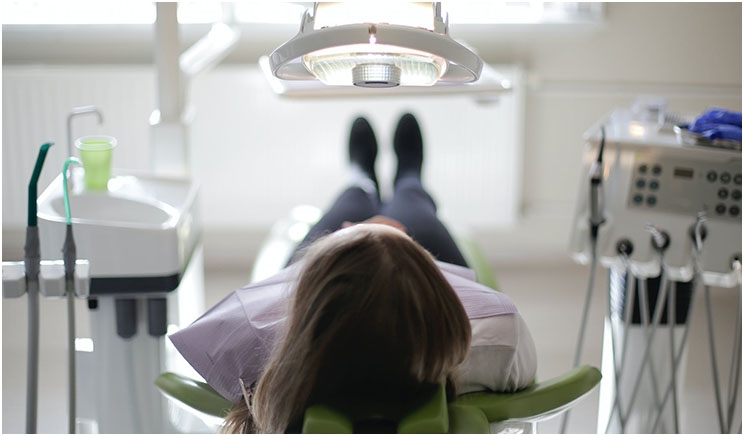
A recent article by The New York Times presented a very interesting new twist in the dental world as it relates to COVID-19. According to the article, some “experts” are suggesting that people who already have dental problems may see them aggravated by encounters with the coronavirus.
While it is impossible to discern whether COVID-19 is actually causing dental problems or whether patients’ issues were already bound to become worse, this news underlines the importance of making dental health a priority.
It remains to be seen whether COVID-19 exacerbates dental problems, but it is clear that regular dental checkups and taking care of small problems before they become large challenges is more essential than ever.
As Reported by the Times
The Times tells the story of Farah Khemili, 43, of Voorheesville, New York, who said that she has never before lost an adult tooth. She survived a bout with COVID-19 this spring and self-identifies as one of the “long haulers,” or those who have continued symptoms such brain fog, muscle aches, and nerve pain well after their recovery.
Recently, while sucking on a breath mint, she claims to have experienced a strange sensation and felt that one of her bottom teeth had unexpectedly become loose. The next day, the tooth fell out, painlessly and without any bleeding.
Although I have never examined this person, there is no medically sound means to claim that this tooth loss was due to COVID-19. In fact, this is merely anecdotal, and the claim could be disproved simply by comparing the patient’s most recent X-rays with her pre-virus X-rays, as she may have had an existing case of periodontitis, for instance.
Interestingly, though, Khemili is part of an online support group for COVID-19 survivors whose other members have described teeth falling out, as well as sensitive gums and teeth turning gray or chipping. She and other survivors unnerved by the virus’ well-documented effects on the circulatory system, as well as symptoms such as swollen toes and hair loss, suspect a connection to tooth loss as well.
However, there is yet to be any rigorous evidence that the infection can lead to tooth loss or related problems. And with a lack of data, I must agree with dentists such as our colleague Dr. David Okano, a periodontist at the University of Utah in Salt Lake City, who is specifically cited as being skeptical that COVID-19 alone can cause dental symptoms.
Okano does note that as patients recover from acute infections and contend with long-term effects as a result of COVID-19, existing dental problems may be known to worsen. As a profession, we must be diligent in communicating to patients the risks of putting off regular dental health checkups and recommended treatments exclusive of COVID-19.
Khemili, for example, indeed had a history of dental issues before contracting the coronavirus. After she lost her tooth, her dentist reported that her gums were not infected but she had significant bone loss from when she used to smoke, which might be appropriately defined as a dental comorbidity.
Other Hypotheses
Other members of the support group told stories of themselves or their loved ones losing teeth that previously were normal and healthy with no underlying disease.
Dr. William W. Li, president and medical director of the Angiogenesis Foundation, a nonprofit that studies the health and disease of blood vessels, was consulted for the article and hypothesized that the blood vessels in the gums may have been affected by the coronavirus since there was no blood loss when the teeth fell out.
Because COVID-19 binds to the ACE2 proteins found in the lungs, as well as to the nerve and endothelial cells, Li explained that it is possible the virus has damaged the blood vessels that keep the teeth alive in COVID-19 survivors, which may also explain why those who have lost their teeth feel no pain.
Dr. Michael Scherer, a prosthodontist in Sonora, California, surmised that it’s also possible that the widespread immune response known as a cytokine storm may be manifesting in the mouth as a defense mechanism similar to other inflammatory health conditions, such as cardiovascular disease and diabetes, that also correlate with gum disease in the same patients.
It is important to note that there is no correlative data from dentists to support this hypothesis, but it is worth exploring through rigorous scientific research in the future. At this current juncture, we must continue to relentlessly advise patients to maintain good dental hygiene and create awareness that there are many underlying physical health issues that can impact dental health, including COVID-19. At the same time, we must encourage patients to address emergent problems immediately, even during the pandemic, by offering them total confidence in the safety of visiting their dentist.
As medical professionals, we must always be on the lookout for unexpected consequences of the novel coronavirus in our mission to try to understand the long-term dental effects of this confounding disease. But first and foremost, we need to continue to focus on the overall value of maintaining dental health.
Dr. Josephs practices implant cosmetic and general dentistry with an emphasis on implants, veneers, and complex crown and bridge treatment in Palm Beach, Florida. He is on the staff at JFK Medical Center and is a faculty advisory board member at McGill University’s Faculty of Dentistry. He completed his residency at Manhattan’s Beth Israel Medical Center and Mt. Sinai Hospital and was published in the Journal of the ADA in October 2017. He also is a twice published author, writing Tooth Talk and More Tooth Talk, the latter publishing in 2020. Learn more at palmbeachdentist.com.
Related Articles
Warn Your Patients About the Risks of DIY Dentistry
Use Extraoral Suction Technology to Make Your Dental Office Safer
Does COVID-19 Cause Missing Teeth?











